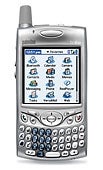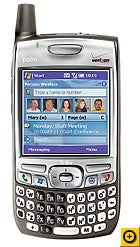The unimaginable has finally happened: Palm, once considered the arch-nemesis of Microsoft in the handheld universe, has joined forces with the software behemoth to produce a Windows Mobile-based Treo, the 700w. It's the end of the PDA world as we knew it.
But it's also a real opportunity to compare the Palm and Windows Mobile operating systems on more or less equal hardware, since the Treo 700w looks a lot like the Treo 650.
I own a Treo 650, which I reviewed in late 2004; and Palm recently lent me a Treo 700w for review. True, I haven't lived with the Treo 700w the way I have with the 650, and there are some quirks you only discover over time. But if you're ready to take the Treo plunge and are wondering whether to go with the Palm OS or Windows Mobile version, here are some observations.
First of all, remember that you aren't making this purchase in a vacuum: You'll be taking on a network along with the device. Part of the Treo 700w's appeal is that it supports one of the fastest data networks available, Verizon Wireless's EvDO BroadbandAccess service. If you're in an area where Verizon Wireless offers its 3G service, the 700w will download Web pages and e-mail faster than any other cellular carrier's handheld as of this writing.

The fastest Treo 650 is carried by Cingular. It supports Cingular's EDGE service, which typically performs like very good dial-up. The Sprint and Verizon versions of the Treo 650 support these carriers' 1xRTT data networks, which are somewhat slower than EDGE.
The Treo 700w beats the 650 on several other specs. The 700w has 128MB of built-in memory; the 650 has a paltry 32MB. (Both have Secure Digital Card slots that you can use to add memory or applications.) The 700w has a 1.3-megapixel camera; the 650's can only capture VGA images, the equivalent of 0.3 megapixel.
Both the devices are powered by a 312-MHz Intel XScale processor; both use the same charge/sync connector; and if you want to listen to music in stereo, you can use the same headphone adapter on either model.
The Treo 650 does win on one key spec: Its screen resolution is 360 by 360, compared to 240 by 240 for the 700w on a display that's a hair larger than the 650's. But I can't say the difference was noticeable enough to be a major factor in my evaluation. Same goes for the weight: The 700w is a mere tenth of an ounce heavier than the 650.
Bottom line on hardware: The Treo 700w wins for performance, but that's not because it's a Windows Mobile device. Palm could easily create a Palm OS-based Treo for EvDO or HSDPA (the GSM/GPRS high-speed counterpart) that would be just as fast and pack more memory--and it likely will.
That brings us to differences that do relate to the OS, which basically boil down to user interface. Palm has always insisted that the Treo is first and foremost a phone, and as such should be easy to use with one hand, without a stylus. Both the 700w and the 650 allow you to do this very well.
However, I found it easier to look up a contact with the Treo 650: Click the Phone button, then the Contacts button, then type in the first initial and the last name of the person you wish to call. It turns out that this is a pretty efficient way to do the lookup.
When you hit the Treo 700w's Phone button, you get the Windows Mobile Today screen, to which Palm has added a contact lookup field (one of many Palm modifications to the standard Windows Mobile OS). If you start typing, the OS assumes you are doing a contact lookup. But the lookup isn't the same as on the 650: With Windows Mobile, if you want to search by first initial and last name, you have to type a space between the two. Otherwise, the OS assumes you are searching by either the first name or the last name. If you have several contacts with the same last name, you might not get to the one you want as quickly.
You don't have to search by name; you can start keying in a phone number. However, the software assumes you're searching for a name until it runs out of contacts that would meet the search criterion; at that point it assumes you were dialing in a number. With the 650, if I hit the Phone button and start composing a number using the keypad, the device knows that's what I'm doing right away.
Getting to call logs is a snap with the Treo 650 since there's a Call Log button right on the Phone screen; with the 700w, call logs are a menu option on the Today screen. Since I frequently use call logs to initiate calls, I found the extra steps required by Windows Mobile somewhat annoying.
 But Palm has given the 700w phone features I wouldn't mind having on my 650, starting with its speed dial. You can create speed-dial buttons on the Today screen with either text (e.g. "Mom," "Dave") or thumbnails of photos you've attached to Pocket Outlook contacts.
But Palm has given the 700w phone features I wouldn't mind having on my 650, starting with its speed dial. You can create speed-dial buttons on the Today screen with either text (e.g. "Mom," "Dave") or thumbnails of photos you've attached to Pocket Outlook contacts.
You can also answer an incoming call with a text message--assuming the call is coming from a phone that accepts text messages, which most cell phones do these days. The 700w's Pocket Outlook Contacts offers assistance here since it identifies incoming calls not only by name, but also by which phone a contact is using, so you can see if the call is from a mobile phone.
Palm also added a voice-mail management system that uses icons rather than numbers. You can set it up for different voice-mail systems (e.g. home, office, and of course Verizon Wireless's voice mail) so that you don't have to remember which numbers to punch in to replay a message, delete it, and so on.
Both the Treo 700w and the 650 offer out-of-box support for Microsoft Exchange e-mail, the former through its Windows Mobile messaging center and the latter through its bundled VersaMail application. The Treo 700w's e-mail application also supports Hotmail, a nice plus. (With other devices--including the 650--you have to access Hotmail via a browser.) But you must set up your Hotmail access via the Pocket MSN screen; if you use the default e-mail account setup, you'll just be sent to Pocket MSN and have to start over.
For basic e-mail management, however, the Treo 650's VersaMail is superior to the 700w's messaging center. Windows Mobile's settings are sparse, to say the least. For example, VersaMail lets you specify whether to delete messages on the server after you've downloaded them, and I saw no such option in Windows Mobile.
Also, VersaMail lets you mark specific, nonsequential messages and then sort or delete them as a group; there's no way to select a group of messages using Windows Mobile's default POP3 application.
VersaMail isn't perfect: It retrieves messages before sending outbound e-mail, and sometimes I don't want to have to wait for all the e-mail to arrive before I send a message. But after checking out the Windows Mobile offering on the Treo 700w, I'm happy to stick with what I've got.
Overall, that about sums up my feeling about the Treo 700w. It's fast; it's got a few nice phone features; and if I have to use a Windows Mobile hybrid, I'd rather have a Treo than any of the other Windows Mobile smart phones I've seen. But do I feel any desire to surrender my Palm OS-based Treo? No. I'll just upgrade when a faster version comes along. The best things about the Treo 700w have little or nothing to do with Windows Mobile.
No hay comentarios.:
Publicar un comentario